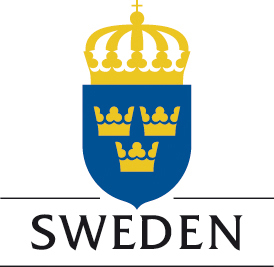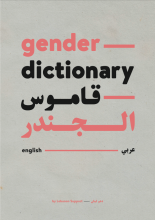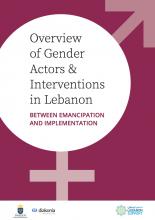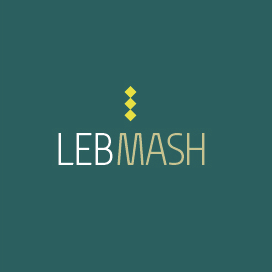


Issue 7, June 2016
About the newsletter
Why the Gender Equity Newsletter?
This newsletter aims to connect gender actors and practitioners in Lebanon through the exchange expertise, in an attempt to create a space for better collaboration, networking, and equal access to knowledge, research, and information. Each issue will cover the work of actors, their activities, and projects, in addition to recommending relevant resources and tools, as well as information and statistics relevant to gender work in Lebanon
The gender equity newsletter is a part of the Gender Collaborative Information and Knowledge Network- a project by Lebanon Support in partnership with Diakonia
The Gender Collaborative Information and Knowledge Network is an online collaborative platform. It is part of Lebanon Support’sCivil Society Knowledge Centre (CSKC) and brings together civil society organizations, researchers, practitioners, and experts to enhance local and national capacities, improve access to knowledge and its development, and provide evidence-based research, information, and literature on gender issues and concerns.
1. Featured resources on the Gender Equity Information & Research Network

Gender Dictionary: traveling concepts and local usages in Lebanon
By: Lebanon Support
The Gender Dictionary, published by Lebanon Support, is a practical bilingual tool, based on multidisciplinary research and consultations with local gender actors (academics, experts, activists, practitioners).
This bilingual dictionary examines the definitions, history and localized usages of gender terms and concepts. It is constituted of 25 entries, organized in alphabetical order with their equivalent and definitions in both Arabic and English. Each entry or definition proposes a general presentation of the term, a synthetic overview of its inherent debates with a focus on its local usages and understandings. Read more.

Overview of Gender Actors & Interventions in Lebanon
By: Lebanon Support
This report aims to present a general overview of the current local gender actors and their interventions in Lebanon. It also aims to shed light on the complex relationship between women’s organisations in Lebanon and their donors. In this context, it is important to ask to what extent the funding tends to shape project design at a local level? And moreover, does funding of short-term and service-oriented projects edulcorate the political change that these organisations could bring?
Read more.
--------------------------------------------------------------------------------------------------------------------------------------------------------------------------------------------------------------------

The Gender Dictionary, first localised bilingual resource of its kind is also available for sale at our office, Librarie Antoine, and Virgin Megastore.
For more info, contact us on: contact@lebanon-support.org
Download the pdf of the Gender Dictionary on this link.
--------------------------------------------------------------------------------------------------------------------------------------------------------------------------------------------------------------------
The Civil Society Review, the first peer-reviewed journal on civil society issues in Lebanon, is for sale at our office, Librairie Antoine, and Virgin Megastore.
For more info, contact us on: contact@lebanon-support.org
A preview is available here.

--------------------------------------------------------------------------------------------------------------------------------------------------------------------------------------------------------------------
2. FOCUS ON

LebMASH Lebanese Medical Association for Sexual Health
LebMASH is a non profit organization governed by a board of eight health care professionals from various disciplines with the mission of Advancing healthcare for LGBT individuals and sexual/reproductive health for all individuals in Lebanon.
In 2013, LebMASH worked closely with the Lebanese Psychological Association and the Lebanese psychiatric association which lead to these two organizations issuing position statements stating that homosexuality is not a disease and does not require treatment and shedding the light on the futility and dangers of conversion therapy.
In 2016, LebMASH launched the video “Shu El Sabab” reinforcing the fact that homosexuality is not a mental illness and explaining that conversion therapy is counterproductive and can lead to many negative health consequences.
Gender inequality comes in many shapes and forms given that we still live in a patriarchal society in Lebanon. Since LebMASH is a health non profit organization and through our experience we noticed that women sexual health, orientation and sexual identity is one of the main poorly tackled issues in Lebanon. Women’s sexuality in Lebanon is still taboo, which complicates their access to health services and endangers their safety in case they were vocal about their sexuality. Gender equality starts from giving women equal rights and deconstructing the power hierarchies and structural violence that women undergo in society, and extends to acknowledging their sexuality and not as unspoken of taboo.
LebMASH believes the main demands of gender actors should focus:
-
Objecting and fighting conversion therapy that still takes place in psychological and psychiatric practices with lesbian and trans women
-
Standardizing the healthcare of trans men and women and elevating it to a safe, consent-based and evidence-based practice
-
Breaking the taboos around women sexuality, virginity, and sexual orientation
-
Providing women with better access to health care on all levels, including gynecologists and therapists
-
Fighting sexual harassment and rape and providing safe spaces for women to be vocal about these violations
-
Gaining access to information and resources about contraception and other reproductive health services without facing any discrimination and while valuing women’s ownership of their own bodies
3. Gender news
On the 15th of May, two days before the International Day against Homophobia, Transphobia and Biphobia, activists backing the LGBT movement staged a protest outside the Hbeish gendarmerie in Beirut demanding the abolition of the law criminalising relations “against nature” and the release of four transgender women. The last protest of this kind was held in Beirut in 2012.
Hundreds of migrant domestic marched in Beirut on the occasion of International Workers Day, denouncing their working conditions under the Kafala system.
A transgender man was granted the right to rectify his legal status in civil registry by Lebanon’s Court of Appeals. Judge Jannet Hanna, who issued the verdict, emphasized the importance of allowing sex change to relieve the person from the psychological and social sufferings.
An anti-harassment rally was organised in Amman to raise awareness on the verbal harassment experienced by women when they go out alone.
Amnesty International published its policy on protection of sex workers from human rights violations and abuse which calls for decriminalisation of consensual sex work, along with four research reports on these issues.
A campaign gathering female politicians, journalists has been launched in France against sexism and sexual harassment in politics, with seventeen female politicians across the political spectrum signing an appeal pledging to make public all sexist behaviour and harassment.









